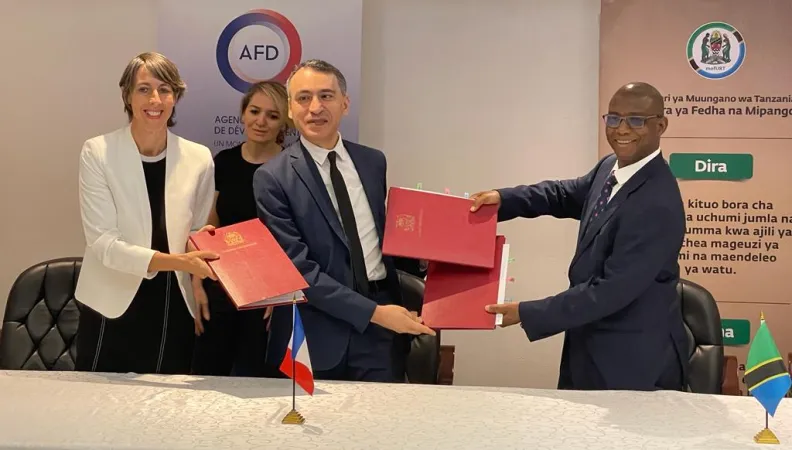Share the page

The Government of Tanzania and the French Development Agency (AFD) signed today a financing agreement for a 75M€ concessional loan (approximately 195 bn TZS) aiming at improving water supply and sanitation services for the residents of Shinyanga Municipality. The financing’s ultimate goal is to improve the inhabitants’ living conditions, the environment, as well as the city’s economic development through extension and renovation of drinking water and sanitation services.
In Shinyanga there is no sewerage system, as most sanitation facilities are on-site systems such as pits and latrines, and the town has only recently been equipped with a small scale feacal sludge treatment facility that is supposed to cover the whole municipality and its town centres. This limited sanitation capacity carries a high risk for water borne diseases in the municipality, with impacts on the dwellers’ health and livelihood.
Besides, only 61% of the population has access to improved drinking water. The highest prevalence of diseases has been correlated with using shallow wells as source of water and purchasing water from local vendors.
The project aims to :
- Give a continuous and sustainable access to a quality water to 95% of the population by 2025. The program will reduce water losses by 10%, through rehabilitation of the existing Ningw’a Dam and its water treatment plant, the construction of a new water reservoir of 2,500m³ and expansion and rehabilitation of 278km of existing and new transmission and distribution Water networks (88% expansion of new water networks and 12% reinforcement of the existing network). Besides the programme aims at rehabilitating the existing 100km of transmission and distribution water networks, the electromechanical equipment’s and implementation of the Supervisory Control and Data Acquisition (SCADA).In addition, 50 water kiosk implemented to give access to the lowest income households .
- Give access to sanitation services to at least 45% of the population by 2025. The program comprises set up of 4 feacal sludge treatment facilities in Shinyanga town and town centers, construction of about 30 toilets in schools, and 5 in dispensaries/hospitals and other identified public places.
- Provide Technical Assistance for the project’s implementation and capacity building of SHUWASA. The program will be implemented by Shinyanga Urban Water and Sanitation Authority (SHUWASA), that will benefit from technical assistance in managing investment projects, but also in becoming more effective in its fight against water losses. Besides the programme will ensure improvement of the management of the on-site sanitation via capacity building of SHUWASA, a sanitation marketing strategy and the improvement of the local institutional framework, sanitation campaigns and awareness creation.
Upon completion of this project, it is expected that approximately 200,000 people would benefit from the investment in water supply, 100,000 people from the investment in sanitation, and 50,000 people from awareness campaigns on hygiene.
This event represents an important step forward in AFD’s cooperation with the government of Tanzania, which started more than 20 years ago and has significantly increased since then. The water and sanitation sector has historically been one of AFD’s primary sector of intervention in Tanzania with 332 M€ (861 bn TZS) financings to this sector over the last 10 years.
AFD is working hand-in-hand with the Government of Tanzania to support the achievement of its objectives on Water and Sanitation through 3rd phase of the new Water Sector Development Program.
Press contact : Bérénice Oroyo-Pierronnet
